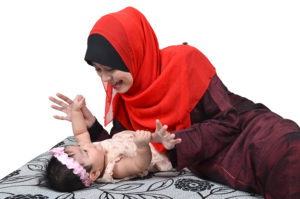How comfortable are we with Islam’s position on abortion? Can we really use mainstream consensus and opinion as the barometer for how ‘with the times’ Islam is? It’s time we look at the facts, rulings and basis of Islam’s take on abortion.

If you’ve been watching the news, listening to the radio or been active on social media for the last couple of months, I don’t doubt that you’ll have come across the latest cause of uproar in the US- the overturning of the Roe v Wade ruling regarding women’s right to abortion. In summary, the US Supreme Court has overturned this 50 year old ruling which until now gave American women the constitutional right to abortion. This recent judgement allows individual states to ban, or introduce restrictions to abortions- half are expected to do so, while thirteen states have already passed ‘trigger-laws’ which automatically make abortion illegal.
As always, the narratives and opinions surrounding this debate have been varied, but something that has struck me is the off-hand references to Islam and Shari’ah. On the one hand, pro-choice advocates have compared this recent judgement to ‘Shari’ah Law’, while some Muslims and even non Muslim, pro-choice advocates often say that ‘even Islam allows abortions under certain circumstances’.
How comfortable are we, as Muslims, with Islam’s position on abortion, though? Can we really use mainstream consensus and opinion as the barometer for how ‘with the times’ Islam is?
Perhaps it’s time we look at the facts, rulings and basis of Islam’s take on abortion. No doubt, as parents especially, we need to be well equipped and well versed in the debates that our children will inevitably be a part of.
Sanctity of life
There are numerous verses in the Qur’an signifying the utmost value of human life:
Because of that, we decreed upon the Children of Israel that whoever kills a soul unless for a soul or for corruption [done] in the land – it is as if he had slain mankind entirely. And whoever saves one – it is as if he had saved mankind entirely. (Quran, 5:33)
And do not kill the soul which Allah has forbidden, except by right. And whoever is killed unjustly – We have given his heir authority, but let him not exceed limits in [the matter of] taking life. Indeed, he has been supported [by the law]. (Quran, 17:33)
as well as Prophetic narrations from sources from both of the two main Islamic schools of thought:
“If the residents of the Heavens and the Earth conspire (as accomplices to collaborate) to collectively shed the blood of a believer, God will throw all of them into the fire of hell.…” ¹
“The very first matter to be decided between people on the Day of Judgment will be the cases of bloodshed.” ²
Allah as the Giver of life
There are also several verses in the Qur’an demonstrating that life is only Allah’s to give and take, unless we are commanded otherwise:
And that it is He who causes death and gives life. (Quran, 53:44)
And a sign for them is the dead earth. We have brought it to life and brought forth from it grain, and from it they eat. (Quran, 36:33)
And He is the one who gave you life; then He causes you to die and then will [again] give you life. Indeed, mankind is ungrateful. (Quran, 22:66)
The Debate
Now that it is established that human life is sacred, and that Allah is the One who decides who lives and who dies, the question is: when does human life actually begin? Is it at conception? When there are a certain number of cells present? When organs have formed?
Let’s look at death, instead- Allah says:
And when I blow my spirit into him (Quran 15:29)
and:
O contented soul return to your Lord being pleased with Him and He with you (Quran 89:28)
Islam teaches that the soul or spirit of a human returns to Allah when we die- the soul is essentially what we are referring to as us or me, rather than our bodies. Therefore, the question of when life begins, becomes a question of when the soul enters the embryo- and there are varying opinions on this.
Amongst the four Sunni schools of thought, there is agreement that by 120 days, ensoulment (the entering of the soul into the body or embryo) has taken place, and abortion is absolutely forbidden beyond this point unless continuation of the pregnancy endangers the life of the mother.
Traditionally, the Maliki school has been the strictest, opposing even birth control. The Hanafi school takes a more lenient approach, allowing abortion up to 120 days into the pregnancy. The Hanbali school takes another approach, allowing abortion up to the first 40 days of pregnancy, and only between 40 and 120 days if there is a ‘pressing’ reason such as rape or extreme deformity of the foetus.
According to a tradition from the eighth Shi’a Imam Ali al-Ridha:
“It is when the bones are covered with flesh that the spirit enters into the body, and subsequent to that it is made into another creature.” ³
Another narration from the fifth Shi’a Imam Muhammad al-Baqir who states:
“The stage of the fertilized ovum is forty days, the stage of the clot is forty days, the stage of the lump of flesh is forty days. When four months are completed the foetus’s destiny and gender are determined. Subsequent to this it is another creature.” ⁴
Therefore, ensoulment is believed to be around 4 months.
The rulings of various Shi’a Jurists are as follows and are generally in agreement:
Sayed Ali Sistani: Abortion is not permissible, even if the baby is deformed. If the continuation of the pregnancy considerably endangers the life of the mother or puts her in unbearable difficulty, then abortion is only permissible before ensoulment (4 months).
Sayed Taqi al Modarresi: Abortion in impermissible unless continuing with the pregnancy would end the mother’s life, in which case it would be permissible to abort the foetus before ensoulment (120 days).
Sayed Ali Khamenei: Aborting the foetus is forbidden by Islamic law. It is not permissible at any count, even if the baby is deformed, barring pregnancy which poses danger to the mother’s life (permissible within the first 120 days)…whoever causes the abortion should pay the blood money.
Conclusion
Islam’s position on abortion is far more nuanced than ‘pro-life’ or ‘pro-choice’ and unlike either end of the spectrum of the general debate on abortion in secular society, places utmost importance and value on the soul, rather than the physical bodies of either the mother or foetus. While this topic is a tough one to get our heads around, it is also one which if we educate ourselves more about, will open our eyes to an Islamic way of thinking that we may not have been exposed to previously. May Allah grant us the opportunity to learn, and equip ourselves and our families with knowledge and wisdom.
References
¹ Kanz al- Ummal, vol. 15, page 19
² Collected by al-Bukhâri (6471) from ‘Abdullâh b. ‘Umar
³ Kashani, 1415/1995, p. 13
⁴Bahrani, 1999, p. 335


